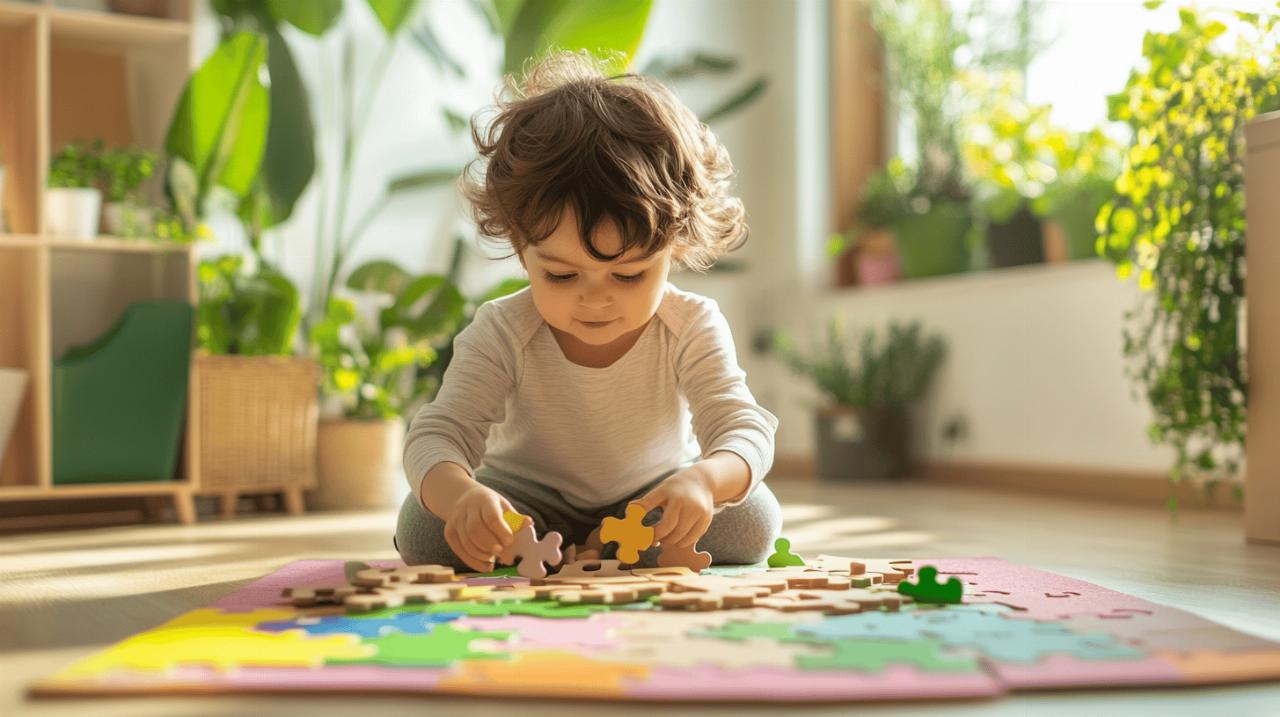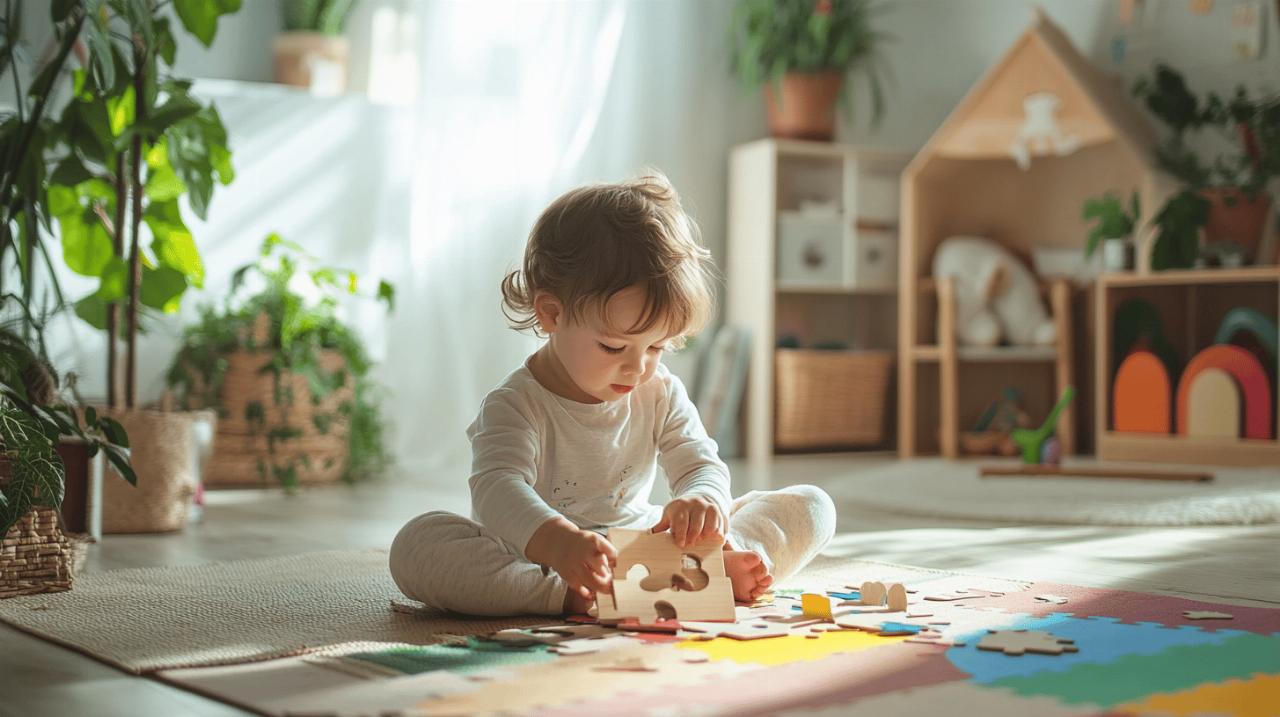Montessori Puzzle Magic: Why These Organic Wooden Toys for Children Are the Eco-Conscious Parent’s First Choice
In an age where the choices we make for our children ripple far beyond the playroom, the allure of Montessori wooden puzzles has captivated the hearts of parents who seek more than mere entertainment. These timeless treasures, crafted from organic materials and rooted in a philosophy that celebrates independence and discovery, offer a harmonious blend of learning and sustainability. As families increasingly turn towards eco-conscious living, the gentle touch of wood and the thoughtful design of each puzzle piece have become symbols of a deeper commitment to nurturing both young minds and the planet.
The Enchanting World of Montessori Puzzles: Tools for Tiny Explorers
Why montessori wooden puzzles captivate young learners
The appeal of Montessori wooden puzzles lies in their ability to transform playtime into a journey of exploration. Unlike the fleeting distractions of modern plastic toys, these carefully designed educational tools invite children to engage with the world around them in a meaningful way. Each puzzle piece, shaped from natural wood, carries a unique texture and weight that awakens the senses and encourages curiosity. The simplicity of the design is deliberate, allowing young learners to focus without the overwhelming stimulation that often accompanies brightly coloured synthetic alternatives. This sensory-rich experience not only connects children to nature but also fosters a sense of calm and concentration that is essential for deep learning.
Moreover, the tactile nature of wooden puzzles supports the development of fine motor skills and hand-eye coordination. As tiny fingers grasp and manipulate each piece, they are practising the delicate movements that will later support writing, drawing, and countless other tasks. The act of fitting geometric shapes into their corresponding slots becomes a lesson in problem-solving and spatial reasoning, gently guiding children to understand cause and effect. This hands-on engagement is at the heart of the Montessori method, which values experiential learning over passive instruction. The result is a child who is not merely entertained but genuinely empowered to explore, experiment, and discover.
The philosophy behind every carefully crafted piece
The Montessori approach, pioneered by Maria Montessori, is built on the belief that children learn best when they are free to follow their natural curiosity. Wooden puzzles embody this philosophy by offering open-ended play opportunities that encourage independent thinking. Rather than prescribing a single way to interact with the toy, these puzzles allow children to explore at their own pace, making choices and learning from their mistakes in a supportive environment. This sense of autonomy is crucial for building confidence and a lifelong love of learning.
Maria Montessori also emphasised the importance of connecting children with the natural world, and wooden toys serve as a bridge between the indoor play space and the outdoors. The warmth and authenticity of wood provide a sensory experience that synthetic materials simply cannot replicate. This connection to nature is not merely aesthetic; it fosters an appreciation for the environment that can shape a child's values and behaviours as they grow. By choosing toys made from sustainable, organic materials, parents are making a conscious decision to align their parenting practices with their environmental values, setting an example for the next generation.
Developmental wonders: how montessori puzzles shape growing minds
Building foundations: fine motor skills and hand-eye coordination
The developmental benefits of Montessori puzzles extend far beyond simple entertainment. As children manipulate the wooden pieces, they are engaging in activities that refine their fine motor skills and enhance hand-eye coordination. These foundational abilities are critical for a wide range of tasks that children will encounter as they grow, from fastening buttons to holding a pencil. The act of grasping a puzzle piece, aligning it with the correct slot, and pressing it into place requires precision and control, skills that are honed through repeated practice and exploration.
Wooden puzzles also introduce the concept of object permanence in subtle and engaging ways. For instance, puzzles that involve a ball disappearing into a drawer and reappearing teach babies that objects continue to exist even when they are out of sight. This understanding is a significant cognitive milestone, laying the groundwork for more complex reasoning and memory skills. The tactile feedback of wood, combined with the visual satisfaction of completing a puzzle, creates a multisensory learning experience that reinforces these concepts in a way that is both intuitive and enjoyable.
Cognitive leaps: problem-solving and spatial awareness through play
Beyond physical skills, Montessori puzzles are powerful tools for cognitive development. The process of determining where each piece belongs requires children to engage in problem-solving and logical reasoning. They must observe the shape and colour of each piece, compare it to the available spaces, and make decisions about where it fits. This trial-and-error process is a natural and effective way to develop critical thinking skills. Each successful placement reinforces the child's understanding of spatial relationships and patterns, building a foundation for mathematical and scientific reasoning.
The simplicity of wooden puzzles also encourages creativity and symbolic thinking. As children become more familiar with the puzzles, they may begin to use the pieces in imaginative ways, incorporating them into stories or games. This type of open-ended play is invaluable for fostering creativity and flexible thinking. The durability of wooden toys means that they can withstand years of such imaginative use, making them a lasting investment in a child's development. The absence of distracting features such as lights or sounds allows children to fully immerse themselves in the play, creating narratives and scenarios that are limited only by their imagination.
Selecting the Perfect Montessori Puzzle for Your Little One
Age-appropriate choices: from babies to budding problem-solvers
 Choosing the right Montessori puzzle for your child involves considering their current developmental stage and abilities. For babies aged zero to six months, simple sensory toys such as wooden teethers or rattles can introduce them to the textures and weight of wood. As they grow and reach the six to twelve month stage, puzzles with larger pieces and basic shapes become appropriate, encouraging them to practise grasping and hand-eye coordination. Toddlers aged twelve to twenty-four months benefit from puzzles that introduce colour and shape recognition, while preschoolers can tackle more complex designs that involve letters or numbers.
Choosing the right Montessori puzzle for your child involves considering their current developmental stage and abilities. For babies aged zero to six months, simple sensory toys such as wooden teethers or rattles can introduce them to the textures and weight of wood. As they grow and reach the six to twelve month stage, puzzles with larger pieces and basic shapes become appropriate, encouraging them to practise grasping and hand-eye coordination. Toddlers aged twelve to twenty-four months benefit from puzzles that introduce colour and shape recognition, while preschoolers can tackle more complex designs that involve letters or numbers.
It is essential to select toys that match the child's abilities without being too easy or too challenging. A puzzle that is too simple may fail to engage their interest, while one that is too difficult can lead to frustration. Many retailers categorise their products by age, making it easier for parents to find suitable options. Additionally, personalised name puzzles can be a wonderful choice for children aged one to six, as they combine the educational benefits of letter recognition with a sense of ownership and pride. These custom designs are often beautifully crafted and come in gift-ready packaging, making them an excellent choice for special occasions.
Quality Markers: What to Look for in Organic Wooden Toys
When selecting Montessori puzzles, quality and craftsmanship are paramount. Look for toys made from sustainable woods such as maple, cherry, or bamboo, which are not only durable but also environmentally responsible. The finish should be smooth and free from sharp edges, ensuring that the toy is safe for little hands. Many high-quality wooden toys meet stringent safety standards such as ASTM F963 and EN71, which regulate everything from the materials used to the absence of harmful chemicals. These certifications provide peace of mind that the toy has been tested for choking hazards and other safety concerns.
Another important consideration is the versatility of the toy. Open-ended puzzles that can be used in multiple ways or that grow with the child offer greater value and longevity. Handmade toys often exhibit superior craftsmanship, with attention to detail that mass-produced items cannot match. Additionally, consider the aesthetic appeal of the toy. Montessori materials are designed to be beautiful as well as functional, creating an environment that is inviting and conducive to learning. A well-chosen wooden puzzle is not only a tool for development but also a cherished object that can be passed down through generations, embodying both quality and sustainability.
Eco-conscious parenting: the sustainable appeal of wooden montessori materials
Natural materials and your child's health: the organic advantage
For parents who are mindful of the impact their choices have on both their children and the environment, organic wooden toys represent an ideal solution. Unlike plastic toys, which can contain harmful chemicals such as phthalates and BPA, wooden toys made from natural, untreated wood are free from these toxins. This is particularly important for babies and toddlers, who are prone to putting toys in their mouths. The absence of chemical finishes and synthetic dyes means that these toys are safe for teething and exploration, providing parents with confidence in their choice.
The use of sustainable materials also aligns with broader environmental values. Wood is a renewable resource, and when sourced responsibly, it has a far lower environmental footprint than plastic. Many manufacturers of Montessori toys are committed to eco-friendly practices, from the sourcing of raw materials to the production process and packaging. By choosing these products, parents are supporting a market that values sustainability and ethical production. This conscious decision not only benefits the planet but also teaches children the importance of caring for the environment, instilling values that will shape their behaviour and choices throughout their lives.
Lasting value: investing in durable, timeless educational resources
One of the most compelling arguments for choosing wooden Montessori puzzles is their durability. Unlike plastic toys that may crack or fade over time, well-crafted wooden toys can withstand years of play and still retain their beauty and functionality. This longevity makes them a wise investment, as they can be passed down from sibling to sibling or even across generations. The timeless design of these toys means that they never go out of style, remaining relevant and engaging regardless of changing trends in the toy industry.
The durability of wooden toys also reduces waste, contributing to a more sustainable lifestyle. In a world where disposable consumer goods are the norm, choosing products that are built to last is a small but significant act of resistance. The simple, straightforward design of Montessori puzzles ensures that they remain engaging without relying on batteries or electronic components that can fail or become obsolete. This simplicity is not a limitation but rather a strength, allowing the toy to adapt to the child's evolving interests and abilities. The result is a collection of toys that grows with the child, providing continuous learning opportunities and endless hours of imaginative play.
